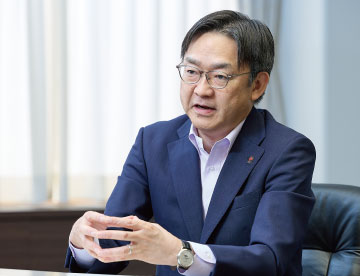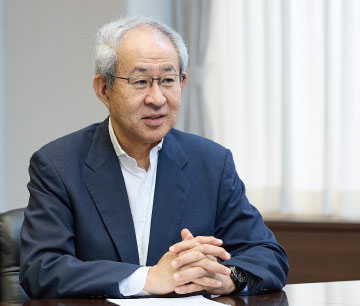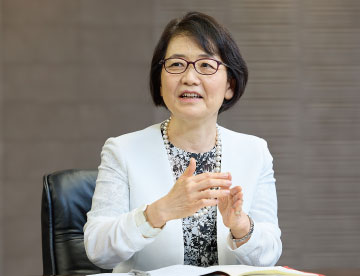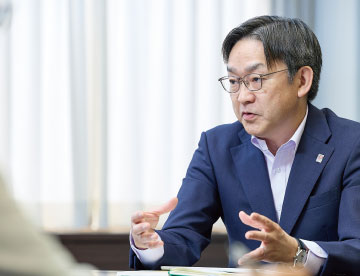
SOMPO’s Purpose Management
Special Three-Way Discussion
Human Capital Management for Enhancing Corporate Value

Kazushi Ambe
Sony Group Corporation
Senior Executive Vice President
Corporate Executive Officer
Chiharu Takakura
Co-Representative, Takakura & Company LLC
Strategic Advisor, Rohto Pharmaceutical Co., Ltd.
Shinichi Hara
Sompo Holdings
Group CHRO
Kazushi Ambe
Joined Sony in 1984. Served as Vice President of Sony Ericsson Mobile Communications and Senior Vice President of Sony Corporation of America, among other positions, before becoming Corporate Executive and then EVP & Corporate Executive Officer at Sony in 2016. Became Executive Vice President & Corporate Executive Officer in 2018 and has served in his current position since 2020. Mr. Ambe is leading a human resources strategy to help every employee grow and take on challenges to achieve Sony Group’s business purpose, to “Fill the world with emotion, through the power of creativity and technology.,” based on its corporate culture of valuing diversity and an equal relationship between the company and its employees.
Chiharu Takakura
Joined Japan’s Ministry of Agriculture, Forestry and Fisheries in 1983. After working as Associate Director of the Human Resources Department at Pfizer Japan Inc., she became General Manager of Global Human Resources at Ajinomoto Corporation in 2014, and then Director and CHRO at Rohto Pharmaceutical Co., Ltd. in 2020. Has served in her current position since 2023. Also serves as an outside director of Mitsui Sumitomo Insurance, Nomura Real Estate Holdings, and Niterra. Ms. Takakura has been leading human resources strategies at global companies in Japan and overseas for more than 25 years. In recent years, as an opinion leader in the human resources field, she has promoted the development of diverse next-generation human resources, for example by focusing on the concept of “Will,” which refers to allowing each individual to determine what kind of value they want to provide to society through their career.
Paradigm shift
Ambe A paradigm shift is taking place today that is making talent a focus of attention. Companies are trying to maximize the potential of each individual employee, which I see as an inevitable result of changes in the social environment and a common awareness of the issues shared by all companies. In addition, because the business environment remains challenging, everyone has a higher sense of urgency than before, and everyone wants to make their own choices and act on their own. This is the change we’ve been witnessing. This is an opportunity for companies, and I believe that seizing it will open up enormous possibilities. Since its founding 77 years ago, Sony has continued to uphold the spirit of its founder, and has always made individual initiative the core of the company’s growth. We are going back to the basics once again and trying to link individual growth to corporate growth.
Takakura I have been involved in the human resources world for about 25 years, and during this time, I have seen a shift in thinking about human capital. Twenty-five years ago, employees were viewed as a resource, but since then, the idea of human “assets” has spread, and concepts such as human resource management, talent management, and succession plans have emerged.
Furthermore, over the past 10 years, employees have become a form of “capital.” Since it is people who create value when creating new things, I believe that the challenge for management has become how to generate value by investing resources in these people.
What I think is important is how to respond to rapid advances and changes in technology and other circumstances. Among these circumstances is the shortage of workers, which means the value of each individual is becoming more and more important. In the younger generation especially, values about work are changing, and they have a new consciousness that they want to do something for society. Hence the term “ESG native.”
Hara The world has changed, and we live in a time where we must focus on the individual. At SOMPO, we have our Purpose, which represents what is necessary to remain an essential organization for society and continue to thrive.
We used to expand our business and grew with our customers, buoyed by the rising population and economic growth. Yet, the demographic shift to “fewer children and living longer” reality changed how society works – along with technological advances. We wondered, “Is our conventional business model a fit for society? Would it be enough to stay solely with insurance?” The vision for innovation kicked off at that point, where we realized that it was time to expand into other fields and change how we offer insurance. We wanted employees and the organization to take on challenges to make the innovation happen. Building an organization and seeking out individuals who enjoy a challenge – that’s what our human capital management aims for. Build an inclusive culture that encourages innovation. Every employee keeps their engagement high and takes on challenges. That is the goal of SOMPO’s human capital management.
Human capital management initiatives

Hara The first step we took toward practicing human capital management was to shift their thinking about “work.” We encouraged employees to change their perception from “I am there for the company.” to “The company is there for me.” We then began MY Purpose to embody that initiative. Let’s look at the company as a stage. Employees are encouraged to describe what they want to accomplish and cherish most in life. They will play the role on the stage represented by the company.
As an intangible measure, we organize “Townhall Meetings,” where the Group CEO delivers messages interacting with employees. We also implement “MY Purpose 1-on-1 meetings” where managers and their members have interactive sessions. We have also established a cross-Group “SOMPO Award” to encourage challenge and innovation through My Purpose, and we celebrate each other’s efforts under the slogan “A Cheer for Every Challenge.” Through these efforts, we strive to transform our corporate culture into one that is full of challenges based on My Purpose.
Regarding tangible structures, we need systems to enable people to develop their careers to realize My Purpose. Therefore, we are expanding the job-based employment and job posting systems to encourage self-driven work styles.
Takakura Over the past 20 years, Rohto Pharmaceutical has grown steadily from 500 to 1,700 employees and from 50 billion yen to over 200 billion yen in sales. What makes me proudest is the fact that we have continued to launch new businesses. We went from being an eye drop company to making skin care our main business. Nowadays, focusing on health inside the stomach, we operate a farm and make and sell hamburgers and other processed foods, and are even entering the field of regenerative medicine.
The key to launching new businesses is the philosophy that has guided Rohto since its founding: “There is no business without people.” It’s a little old-fashioned, but we have a very flat organizational culture, with things like sports days, company trips, and birthday cake parties. Because Rohto has always put people at the center, valuing people as individuals regardless of organizational boundaries, a “hand-raising” culture that values employee initiative has taken root and even younger employees can express their opinions. In such a culture, you can even apply for promotion on your own rather than waiting for promotion from your boss. The goal is to find a place where the purpose of the individual intersects with “Connect for Wellbeing,” which is the company’s purpose and philosophy.
About eight years ago, we also started allowing employees to pursue jobs and businesses on the side. This is due to our Chairman’s belief that “employees are not the property of the company.” The idea is, since they’re not our property, let’s let them do what they want to do and work energetically outside of the company.
The core of the human resources system is that employees should be professionals. This is a difficult task, but we must create value for society, not for the company. Therefore, at Rohto, we do not look for needs in our careers, but work to create needs on our own, considering the future value to society of our solutions.
During my time at Ajinomoto, we presented awards for best practices, similar to the SOMPO Award, after gathering examples from around the world of people promoting our slogan “Eat Well, Live Well.” I think it is very important to bring people into the limelight and recognize them.

Ambe When running a business, we have many assets at our disposal: financial assets, branding, intellectual property, and technology among them. However, one asset in particular, namely talent, is special in terms of being difficult to quantify and visualize and requiring a long time horizon. Above all, because people have agency and ego, they are not like other resources that management is free use however it sees fit. Precisely because of these characteristics, I see great potential in coming to terms with this form of capital we call “people.” Synchronizing “people” as a form of capital with the direction of management requires a certain level of expertise, and I believe this is what is now being asked of human resources departments. I believe that this represents an opportunity for us to increase the value of the human resources function.
Inevitably, we must reexamine the relationship between employees, who have agency and ego, and the company, placing them on an equal footing. Dialogue is important to ensure that employees feel empowered and motivated by the work they are assigned to do. The structures and systems that make up and embody Sony’s culture can be broadly divided into two categories: systems in which the company encourages employees and systems in which employees exercise their own judgment. One system continually asks, “Do you have the desire or interest to take on this kind of challenge?” while the other continually asks, “Please tell us your current thoughts and judgments.” At SOMPO you routinely hold town hall meetings and give SOMPO Awards. Trying to maintain an equal relationship requires you to continue to show respect for individual autonomy, and this is also a form of dialogue in a broad sense.
Hara As you say, dialogue is very important. For example, supervisors and their members regularly interact in MY Purpose 1-on-1 meetings by sharing their MY Purposes. Work and tasks will become part of their MY Purposes, incentivizing them to challenge themselves to consummate MY Purpose.
Ambe What is important is independent agency. I agree with SOMPO’s approach of defining what the company aims to achieve and the significance of its existence, and then having each individual establish their own sense of values. At Sony too, we express our Purpose as the intersection of two overlapping circles, the first circle labeled “Special You” and the second circle labeled “Diverse Sony,” based on Sony’s People Philosophy: “Special You, Diverse Sony.” I think the common driver for the realization of both circles is “growth.” Both individual employees and the company must continue to grow. Growth is the common agenda for both the employee and the company, each of which has very different characteristics.
The most important action in achieving growth is “challenge.” Akio Morita, one of Sony’s founders, said, “Challenges always involve risks, but the risk of not trying is greater than the risk of trying. The opposite of progress is not regress but maintenance of the status quo.” He always said that if you’re satisfied with the status quo, you lag behind the progress of the world, which is to say you regress in relative terms. Through our human resources systems and opportunities, we encourage employees to have a dialogue about continuing to grow together.
When a business takes on a new challenge, it entails great risk, but with insurance products, you feel a sense of reassurance like when someone puts a hand on your shoulder and says, “Don’t worry, it’s all right.” Since SOMPO deals in insurance, I feel that we are developing a business with great significance as society continues to take on challenges.
I learned many things from Microsoft’s efforts to change its corporate culture based on the idea of a “Growth Mindset,” but I’m also keenly aware that changing the culture is extremely difficult and daunting. Instead of denying or changing what exists now, we aim for our vision of the future we aspire to achieve. That is the company’s Purpose and the individual’s My Purpose. I believe that growth can be the biggest common driver for both parties to achieve this goal.

Hara I, too, realize how difficult it is for a large-scale company with a legacy to change its culture.
However, it is also true that gradually, more and more employees sympathize with My Purpose and challenge themselves to realize it.
Takakura The Ito Report on Human Capital identifies three perspectives required for a human resources strategy. The third perspective is organizational and individual behavior change. Without this, the corporate culture cannot change. Rohto continues to say that “there is no business without people,” but what Mr. Ambe just said makes me realize that if this behavioral change is not present in both the individual and the organization, the culture cannot be maintained.
In order to start a new business in the future, it is necessary to choose a direction to head in, and that is something that leaders, the management team, and everyone needs to think about. We need insight into the future to decide where to shine our light. Insight into the future is becoming more difficult than in the past 20 or 30 years. If you spend 24 hours a day on the work in front of you, how will get any insight into the future? Moreover, without time for study and dialogue between different industries, new businesses will not arise. Thinking this way, we in human resources need to create a place where employees can reallocate the time spent on their current work to other areas. The side jobs and businesses I mentioned earlier are exactly this. Without this kind of cross-border learning, you won’t notice the need to change your behavior. As Mr. Ambe said, change is difficult and sometimes you have to change your surroundings to realize it. If cross-border learning can do this, I believe that directing people’s time and energy to areas other than their main work is also part of our job in human resources.
The direction Japanese companies should go
Ambe After Japan’s “30 lost years,” I think growth is more important than anything else. When asked at a press conference what word he would emphasize, the new president of the Sony Group, Hiroki Totoki, emphatically answered “growth.” Sony has six diverse businesses, each of which has many enormous competitors. Since it cannot afford to concentrate its capital in just one business, which is a handicap of its diversity, Sony must continue to create value by using its diversity as a competitive advantage. There is a sense of urgency that we must continue to grow to do this. The growth strategy of generating value from diverse businesses is exactly the same as the human resources strategy of generating value from diverse human resources. I have always valued the opportunity to interact directly with the employees we depend on to support Sony’s future growth, starting with our excellent engineers around the world. Through these conversations, I get the sense that, even more than remuneration, true growth opportunities are the expectations we share. I believe that supporting the growth of individuals leads to corporate growth, which in turn helps us meet the expectations of the capital market.
If corporate value is an indicator of corporate growth, I think that an indicator of employee growth is an engagement indicator that shows that employees are working with enthusiasm and satisfaction. There is objective data showing a clear correlation between highly engaged organizations and company performance. I believe that our goal and responsibility in human resources is to support the growth of the company by supporting the growth of its employees so that they remain a highly engaged group at all times.

Takakura Both companies and individuals need to start thinking about growth again. I have also said that we are in an era of co-growth, where the company and the individual are equal. When individuals take on challenges, the company evolves. As the company evolves, new businesses emerge and there are more opportunities for individuals to take on new challenges. Six years ago, I drew a diagram of this “cycle of co-growth.” To achieve co-growth, Ajinomoto has worked to establish a global human resources system. To continue to grow in the future, we need an ethic of self-denial for our own good. It is human nature to think that if there is growth and success, it will continue, but this impulse must be resisted. I feel that My Purpose, centered firmly on the individual as the source of energy, is very important for adapting to change and growing.
From a management perspective, there are two things to do. The first is to increase the overlap between the direction the company is headed and the thinking of each individual. The second is to continuously send out the clear message that personal growth and the evolution of the company will happen, and that there will be more opportunities to take on challenges.
Hara Your messages have been genuinely encouraging. My Purpose is the source of innovation, which bolsters SOMPO’s Purpose. We will continue our efforts toward realizing MY Purpose.














